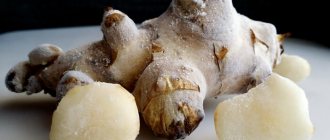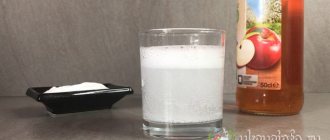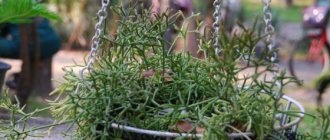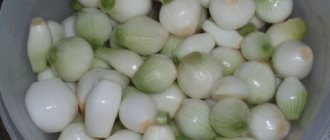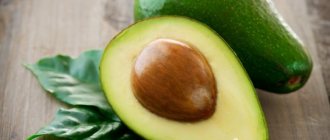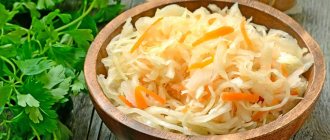Jerusalem artichoke is known precisely by this name, or by the name “earthen pear,” but botanists call it differently – tuberous sunflower (Helianthus tuberosus). Yes, yes, he is the closest relative of the well-known sunflower.
This is a powerful perennial plant that reaches a height of 4 m. It blooms in August - October. It produces the same seeds as its oilseed brother, but much smaller. But its main value is its edible underground tubers.
Jerusalem artichoke is native to North America. There it is found along roads, in fields, in fallow lands and in wastelands. It came to Europe in 1610: first to England, then to France, and then spread throughout the Old World. The earthen pear reached Russia in the 18th century.
In the 1930s, vegetable grower Valyagin promoted the earthen pear as a very productive, frost-resistant and unpretentious crop. In those years in the USSR, with the participation of Nikolai Vavilov, a decision was made: to introduce Jerusalem artichoke into culture and to grow it everywhere on collective farms. But one big problem arose - the tubers were very poorly stored and most of the crop simply rotted in the bins of their homeland. As a result, Jerusalem artichoke was abandoned.
What now? Is it possible to save it? And how to use it later?
- When to dig Jerusalem artichoke
- How to store Jerusalem artichoke
- Where to buy Jerusalem artichoke
- Useful properties of Jerusalem artichoke
- What diseases does Jerusalem artichoke help with?
- Jerusalem artichoke leaves: what are their benefits?
- Healing recipes from Jerusalem artichoke leaves
- Harm of Jerusalem artichoke
- How to eat Jerusalem artichoke: delicious recipes
Jerusalem artichoke tubers are dug up in late October - early November
How to store Jerusalem artichoke
Ground pear tubers are stored well in the basement in wooden boxes. But temperature is important for them - it should be no higher than 2 °C. And they must be sprinkled with sand, since the skin of Jerusalem artichoke is thin and it withers quickly in the air.
It is much safer to keep the tubers in special plastic bags for storing vegetables (they are sold in stores).
Or you can stack the tubers on the balcony. And it’s not scary if they freeze – the taste remains the same. Just remember: if the Jerusalem artichoke has been exposed to open air and light for a long time, you should not eat it. Therefore, it is best to cover the tubers with something dark.
The importance of timely harvesting
The maximum benefit and best taste of the tubers are achieved if they were dug up at the right time. Untimely harvesting worsens the taste and reduces the nutritional value of tubers (we talked about the BJU, calorie content and chemical composition of this vegetable here). If tubers are dug before their ripening period, then some of the nutrients will remain in the greenery of the plant. Late harvesting does not threaten the tubers, but the above-ground part withers and dries out, losing its feeding qualities.
Where to buy Jerusalem artichoke
Jerusalem artichoke here is more of a gastronomic exotic than a familiar product, so you cannot buy it in the vegetable department of the nearest thrift store. However, Jerusalem artichoke is available for sale, and if you set your mind, it is not so difficult to find it, especially during the tuber digging season. Where can I buy Jerusalem artichoke?
- Stores with eco- and organic products. The beneficial properties of Jerusalem artichoke have long attracted the attention of advocates of a healthy lifestyle.
- Vegetable rows of food markets, farmer's fairs.
- Private message boards on the Internet (for example, Avito). Through them, private farm owners often sell surplus crops.
- Hypermarkets, premium grocery stores.
But the best thing, of course, is to simply grow Jerusalem artichokes in your dacha. Planting material can be purchased either from private traders at the already mentioned online flea markets, or you can contact the supplier by asking a question on some popular gardening forum.
Care
Care consists of watering, which needs to be done more often during drought when the soil dries out. The plant needs hilling, which is carried out a couple of times a season. This provides better air access to the rhizome. The first procedure is carried out as soon as the stems grow to half a meter.
Chickens fed Jerusalem artichoke begin to lay eggs a couple of weeks earlier than others.
At the beginning of stem growth, weeds are removed. Once the Jerusalem artichoke is pulled out, it suppresses the growth of weeds. For better development, plants are fed several times a season. During the period of emergence of seedlings, mineral compositions with a high potassium content are used. For the second feeding, you can use urea, and after harvesting, the area is fertilized with a mixture of potassium, nitrogen and phosphorus. Make sure that the plantings do not thicken excessively, as this can lead to a decrease in yield.
If you have not yet been attracted by the nutritional and healing properties of Jerusalem artichoke, as a problem-free plant along fences or along the perimeter of the site, it is definitely more attractive than ordinary weeds. In autumn, yellow flowers can delight the eye and decorate a bouquet.
Do you grow Jerusalem artichoke on your property? Do you have any secrets for growing it? Share in the comments.
Was this article helpful?
Thank you for your opinion!
Write in the comments what questions you have not received an answer to, we will definitely respond!
You can recommend this article to your friends!
Already helped 8 times
Useful properties of Jerusalem artichoke
Jerusalem artichoke tubers are rich in B vitamins, especially a lot of B1. It is useful for the nervous and digestive systems, maintaining heart function.
They also contain a lot of vitamin C, which is responsible for the normal functioning of the immune system.
Tubers also contain a lot of potassium, calcium and zinc. They are loaded with antioxidants. And, of course, Jerusalem artichoke contains a lot of fiber, which stimulates digestion.
Jerusalem artichoke flowers have the same healing properties as the leaves.
Can it be left in the ground for the winter?
Jerusalem artichoke feels great at sub-zero temperatures, and even after complete freezing and subsequent defrosting, it retains its taste perfectly. It is quite possible to leave it in the ground until spring; the main thing is to remember to dig it up before the weather warms up and sprouts appear.
You can also dig up root vegetables during the winter, just before eating them. The main thing is not to forget to insulate the Jerusalem artichokes remaining in the ground with straw, hay or any other covering material.
What diseases does Jerusalem artichoke help with?
Diabetes. The fact is that Jerusalem artichoke tubers contain a lot of inulin - this is an analogue of insulin and it is also capable of breaking down glucose in the body. This means lowering blood sugar levels.
Cardiac ischemia. The tubers contain many biologically active substances, and they prevent the development of this disease. No, they don’t treat it, but if you are prone to problems of this kind, Jerusalem artichoke is an excellent means of prevention.
Anemia. Here we are also talking about prevention. And also thanks to biologically active substances.
Hypertension. The same inulin (as well as other substances in Jerusalem artichoke) can lower blood pressure. This is a plus for hypertensive patients. But the downside for hypotensive people is that they need to eat tubers with caution.
Liver diseases. Jerusalem artichoke tubers contain a huge amount of easily digestible carbohydrates. There are special diets based on Jerusalem artichoke tubers - if you follow such programs, you can easily unload and cleanse the liver.
Jerusalem artichoke leaves are considered more healing than tubers
Healing recipes from Jerusalem artichoke leaves
Jerusalem artichoke leaf tea
Place 1 tbsp in a thermos. a spoonful of crushed leaves (fresh or dry - it doesn’t matter), pour 500 ml of boiling water. After 3 hours, the healthy drink is ready.
How to use. Drink 100 g 20 minutes before meals, no more than 3 times a day.
What does it help with? Strengthens the immune system, improves brain function, helps with constipation.
Jerusalem artichoke tincture
Pour 500 g of dry leaves into 1 liter of vodka and leave in a cool, dry place for 15 days.
How to use. 1 tbsp. Dilute a spoonful of tincture in 150 ml of water. Take 3 times a day.
What does it help with? Cleanses the liver, removes waste and toxins from the body.
Bath infusion
Pour 3 liters of boiling water over 10–15 Jerusalem artichoke leaves and leave for 30 minutes. Strain and pour into a bath of warm water.
How to use. Take a bath for no more than 10 minutes.
What does it help with? Joint pain, radiculitis, gout.
Harm of Jerusalem artichoke
Lowers blood pressure. Inulin and some other biologically active substances contained in Jerusalem artichoke tubers can lower blood pressure. Therefore, hypotensive patients should use it with caution.
Provokes allergies. In rare cases, Jerusalem artichoke can cause an allergic reaction in some people.
Accumulates toxic substances. Jerusalem artichoke is a sanitary plant - its shoots, leaves and tubers have a powerful adsorbing ability and extract toxic substances from the soil. Sometimes it is planted in chemically contaminated fields in order to prevent toxins from entering groundwater - Jerusalem artichoke absorbs them. And then the plants are removed and either disposed of or used for technical purposes. The same thing happens if Jerusalem artichoke grows near highways and in polluted areas - it accumulates benzene, lead, nitrates and nitrites. You can’t eat such Jerusalem artichoke.
How to eat Jerusalem artichoke: delicious recipes
Remember in the movie “Girls” there were 80 potato dishes mentioned? Jerusalem artichoke, of course, is not so popular, but there are also many recipes. One thing: in fresh, unprocessed form, Jerusalem artichoke can cause increased gas formation in the intestines. Therefore, in catering establishments you will not find salads with fresh Jerusalem artichoke. For those planning to try Jerusalem artichoke for the first time, we recommend starting with a small portion.
Boiled Jerusalem artichoke
500 g tubers, 1 onion, salt, pepper, herbs (any) - to taste.
Peel the tubers and cut into large pieces. Soak in cold water with lemon juice for 15 minutes.
Place the tubers in a saucepan, add water and salt. Add onion and spices to the water to taste. Bring to a boil, reduce heat, cover the pan with a lid and cook for 10–20 minutes (depending on the size of the tubers) until tender.
Sprinkle the finished Jerusalem artichoke with finely chopped herbs (dill, parsley, cilantro or green onions) and serve as a side dish or as a separate dish.
Fried Jerusalem artichoke tubers are no less tasty than potato tubers. But it cooks faster and retains more benefits.
Fried Jerusalem artichoke
500 g tubers, salt, pepper, herbs (any) - to taste.
Wash the Jerusalem artichoke tubers and remove the skin. Cut into small slices or circles, soak in cold water with lemon juice for 15 minutes.
Heat the frying pan. Pour in some vegetable oil. Fry the tubers, stirring occasionally, for 3-4 minutes until a tender golden crust forms. Salt and pepper. Turn off the heat, close the lid and leave for another 3 minutes.
Sprinkle with herbs before serving.
Jerusalem artichoke baked in the oven
500 g tubers, 1 tbsp. a spoonful of olive oil, salt, pepper, herbs - to taste.
Wash, peel and soak the tubers in cold water for 15 minutes.
Toss the tubers with olive oil, salt and pepper. Place the tubers on a baking sheet and place in the oven, preheated to 220 °C. Bake for 1 hour.
Sprinkle with chopped parsley and serve hot.
Jerusalem artichoke baked with onions, garlic and herbs
400 g Jerusalem artichoke tubers, 5 onions, 3-4 cloves of garlic, 50 g olive oil, 1 small bunch of herbs (parsley, cilantro or dill), 1 teaspoon of dried herbs, salt and black pepper to taste.
Wash, peel and soak the tubers in cold water for 15 minutes.
Peel the onion and cut into slices. Peel the garlic cloves and finely chop them. In a bowl, mix the oil with herbs, herbs, salt and pepper. Add Jerusalem artichoke and onion there. Stir.
Preheat the oven to 200°C. Place vegetables on a baking sheet and place in the oven for 30–40 minutes.
Serve hot.
Jerusalem artichoke and carrot soup
2-3 Jerusalem artichoke tubers, 2-3 carrots, 2 small onions, 1 stalk of celery, a pinch of ground ginger (to give the vegetable soup a smoky taste), 3 tbsp. spoons of plant milk (for example, soy, almond or rice), 3 tbsp. spoons of olive oil (or any other oil that can be used for frying), a pinch of red pepper, salt to taste.
Wash the Jerusalem artichoke tubers, peel them, cut them into cubes and soak in cold water with lemon juice for 15 minutes. Dice the onion, carrots and celery (do not mix). Pour oil into a deep frying pan and heat. Sauté the onion for 3-4 minutes until golden brown. Pour in 1 liter of water, cover with a lid and bring to a boil.
Add Jerusalem artichoke and carrots. Reduce heat, cover with a lid and simmer for 10 minutes.
Add celery, ginger, plant milk, red pepper and salt. Cook for another 5 minutes.
Mix in a blender until smooth.
Serve hot. Before serving, you can sprinkle with fresh herbs.
Jerusalem artichoke, carrot and apple salad
1 Jerusalem artichoke tuber, 1 carrot, 1 sweet and sour apple, 1 lemon, 1 orange, 1 teaspoon ground ginger.
Peel Jerusalem artichoke, carrots and apples and grate them on a coarse grater.
For the sauce: squeeze the juice from an orange and half a lemon, grate the zest of the other half of the lemon, add ground ginger.
Season the salad with sauce and mix.
Jerusalem artichoke salad with radish
2–3 tubers of Jerusalem artichoke, 1–2 radishes (black radish is the most useful), 2–3 tbsp. spoons of vegetable oil, a few green onions, dill and salt - to taste.
Peel the Jerusalem artichoke and radish, soak in cold water with lemon juice for 15–20 minutes.
Grate the Jerusalem artichoke and radish. Chop green onions and dill.
Place all ingredients in a bowl, add oil, salt and mix.
LiveInternetLiveInternet
–Tags
–Categories
- COOKING (515)
- Cooking magazines (101)
- Cooking recipes (51)
- Fish and seafood dishes (39)
- Poultry recipes (33)
- Potato recipes (30)
- Kebabs (28)
- Snacks (27)
- Pork recipes (23)
- Salad recipes (21)
- Recipes for cooking in pots (21)
- Baking (20)
- Breakfast ideas (14)
- Desserts (13)
- Easter - culinary recipes for the holiday (13)
- ALL ABOUT SMOKING AND SMOKING HOUSES (10)
- Dumplings (10)
- Mushroom recipes (9)
- Cabbage dishes (8)
- KHACHAPURI (7)
- Recipes for dishes made from rabbit and hare meat (6)
- Lunch in 30 minutes (5)
- Solyanka recipes (5)
- First course recipes (4)
- Stuffed dishes (3)
- Sauces (3)
- Jellied meat, aspic (2)
- TOP recipes for Halloween from the site https://kedem.ru (2)
- Pilaf (2)
- Spices, herbs (2)
- Pizza (1)
- Pickles, marinades, preparations (233)
- Cucumbers (40)
- Tomatoes (26)
- Mushroom processing and storage (20)
- Jam, jam, jelly (18)
- Salads (17)
- Eggplant (17)
- Cabbage (15)
- Salo (7)
- Gas stations (5)
- Zucchini (5)
- Pepper (5)
- Watermelons (4)
- Adjika (3)
- Sauces (2)
- Sorrel (2)
- Lecho (1)
- Solyanka for the winter (1)
- Carrots (1)
- Drinks (110)
- Traditional medicine (104)
- Traditional medicine – Medicinal herbs, plants (46)
- Traditional medicine – Beauty and health (18)
- Traditional medicine – Calendula (15)
- Handicrafts (71)
- Knitting (38)
- DIY soap (14)
- Candles (5)
- Sewing (4)
- Embroidery (2)
- Jewelry (1)
- Aromatherapy (36)
- Ideas for a summer house (33)
- Talismans, amulets (33)
- Dream catchers (4)
- Home ideas (27)
- Mystery of the name (21)
- New Year, Christmas (20)
- Useful tips (19)
- Massage (12)
- Houseplants (7)
- Health (7)
- Therapeutic exercise (7)
- Photo frames in PNG (6)
- Bathhouse (2)
- My frames in PNG (1)
- Proverbs (0)
- (0)
- Interiors (0)
- For children (0)
- New Year's recipes (37)
